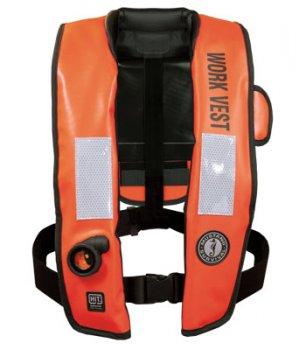Study shows which PFDs are preferable for fishermen

Friday, January 22 2010
Unalaska, AK – The results from last year's personal flotation device study are in. Researchers from the National Institute of Occupational Safety and Health interviewed 400 fishermen who used four different gear types - trawls, crab pots, longlines and gillnets. Two hundred of them tested different types of PFDs for a month. Eight-nine percent of the participants responded to questionnaires about their experiences. Among all of the fishermen, the favorite was a Mustang inflatable work vest.
"It was easy to clean, easy to don," said NIOSH research coordinator Jennifer Lincoln. "The way that it works is it automatically inflates because of water pressure not from a dissolvable tablet. It's made for commercial fishermen. Mustang actually designed it for comfort thinking a fisherman would wear it."
She said they decided to conduct the study because 25 percent of commercial fishing fatalities are due to falls overboard. Though other types of fatalities have declined in the past five years, deaths from falls overboard have not. No one who died from falling overboard was wearing a PFD. However, no organizations keep track of people who are saved when wearing PFDs.
Lincoln said that many fishermen don't wear PFDs because they are bulky, uncomfortable, and get in the way of working. But "we know that there are some manufacturers out there that design and make PFDs that are supposed to be wearable and comfortable. But we wanted to see if fishermen agreed."
They tested six different types of flotation devices. Four were inflatable and two were made of light-weight foam. Three of them were integrated into raingear and three were worn on top. Lincoln said so far, the preliminary data shows that most fishermen liked a Mustang inflatable work vest the best overall. Beyond that, it varied by gear type. Trawl fishermen liked most of the styles. Crab fishermen preferred the inflatable types over the foam, but their preferences changed depending on the weather.
Lincoln and her colleagues are still analyzing the data from the other gear types. She said that now that they have identified PFDs that fit the fishermen's needs, wearing them needs to be enforced.
"It's important that vessel operators have a written PFD policy, whatever that is. If it's wear a PFD when you go out on deck all the time or if it's just wear a PFD when the weather gets bad or when you're climbing the stack. But I think it's necessary that vessel owners and operators have a PFD policy that's enforced on their vessels."
Lincoln is using the data to help PFD manufacturers adjust their products to fishermen's requirements as well as inform fishermen and captains about the available options.



